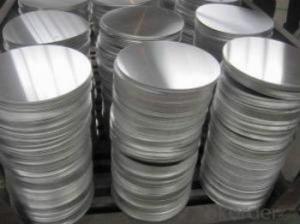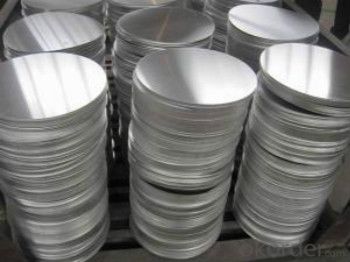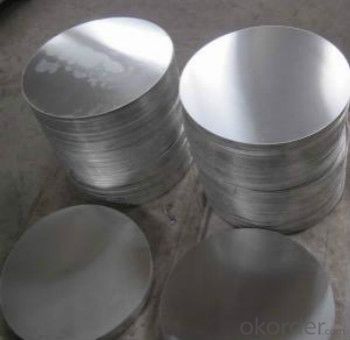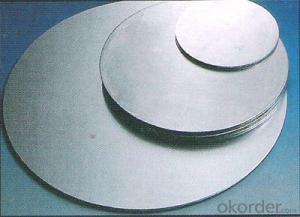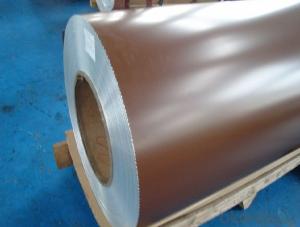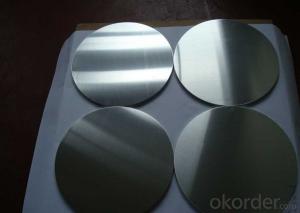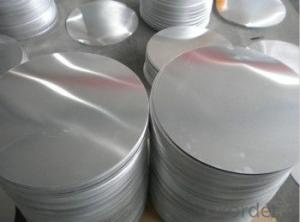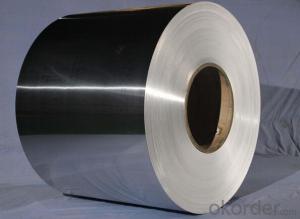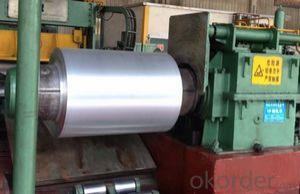3003 Mill Finished Continuous Casting Coil Aluminum Circle
- Loading Port:
- Shanghai
- Payment Terms:
- TT OR LC
- Min Order Qty:
- 5 m.t.
- Supply Capability:
- 2000 m.t./month
OKorder Service Pledge
OKorder Financial Service
You Might Also Like
Specification
1. Structure of CC Aluminium in Coil Form for making Aluminium Circle Description
CC Aluminium in Coil Form for making Aluminium Circle is one semi-finished aluminium material. This coil can be rolled down to aluminium coil,sheet,circle ect. The alloy AA1050 is widly used in building, industry ect. Its weight is much lower than steel. So many customers choosed aluminium material instead of steel.
2. Feature of CC Aluminium in Coil Form for making Aluminium Circle
Surfact Quality :
Be free from Oil Stain, Dent, Inclusion, Scratches, Stain, Oxide Dicoloration, Breaks, Corrosion, Roll Marks, Dirt Streaks and other defect which will interfere with use,
Mechenical Property:
Chemical Composite and Mechanical Property
3. Image of CC Aluminium in Coil Form for making Aluminium Circle
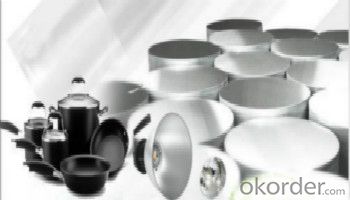
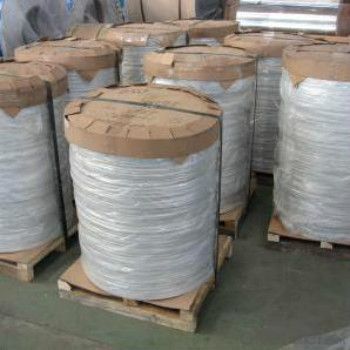
4. Specification of CC Aluminium in Coil Form for making Aluminium Circle
Aluminum Coil/Sheet | |
Main Specification | |
Alloy | AA1xxx (AA1050, AA1060, AA1070, AA1100 etc.) |
AA3xxx (AA3003, AA3004, AA3005, AA3105 etc.) | |
AA5xxx, AA6XXX (AA5052,AA5083, AA5754, AA6061, AA6062 etc.) | |
AA8xxx(AA8011, AA8006 etc.) | |
Temper | H14,H16, H18, H22, H24, H26, H32,O/F, T4, T6, T651 |
Thickmess | 0.01mm-100mm |
Width | 30mm-1700mm |
Standard | GB/T 3880-2006/ASTM |
Special specification is available on customer's requirement | |
5. FAQ
1) What is the delivery time?
Depends on actual order, around 20 to 35 days
2) What is the QC system:
We have QC staff of 20 persons and advanced equipment, each production is with MTC traced from Aluminum ingot lot.
3) What market do you mainly sell to?
Australia, America, Asia, Middle East, Western Europe, Africa etc
4)What about payment term?
30% T/T in advance, balance against B/L COPY.
- Q: Can aluminum coils be used for food processing conveyor systems?
- Yes, aluminum coils can be used for food processing conveyor systems. Aluminum is a popular choice for conveyor systems in the food processing industry due to its various beneficial properties. Firstly, aluminum is a lightweight material, which makes it easier to install and transport. This is particularly important for conveyor systems that may require frequent reconfiguration or relocation. Additionally, aluminum has excellent corrosion resistance, which is crucial in food processing environments where exposure to moisture, chemicals, and food particles is common. Furthermore, aluminum is a hygienic material that is easy to clean and maintain, ensuring food safety standards are met. Lastly, aluminum coils can be easily formed and customized to fit specific conveyor system requirements, allowing for efficient and effective food processing operations. Therefore, aluminum coils are a suitable choice for food processing conveyor systems.
- Q: Can aluminum coils be used in the production of aluminum wire?
- Yes, aluminum coils can be used in the production of aluminum wire. Aluminum coils are often used as a starting material in the wire manufacturing process. The coils are typically unwound and drawn through a series of dies to reduce their diameter and increase their length, resulting in a thin and flexible aluminum wire.
- Q: Can aluminum coils be painted or printed on?
- Yes, aluminum coils can be painted or printed on. Aluminum is a versatile material that can be coated or painted to achieve various finishes and colors. The surface of aluminum coils can be prepared through a process called pre-treatment, which involves cleaning, etching, and applying a primer. This prepares the surface for painting or printing. Painting aluminum coils involves applying a coating system that typically consists of a primer, a color coat, and a topcoat for protection. The paint can be applied using various methods such as spraying, roll coating, or coil coating. Coil coating, in particular, is a commonly used method where the paint is applied to the coil before it is formed into the desired shape. This ensures a uniform and consistent finish. Printing on aluminum coils is also possible using different techniques such as screen printing, digital printing, or lithography. These methods allow for detailed designs, patterns, or even photographs to be printed onto the surface of the aluminum coil. It is important to note that the choice of paint or printing method may depend on the specific requirements of the application, such as durability, weather resistance, or aesthetic preferences. Additionally, proper surface preparation, selection of suitable coatings, and adherence to recommended application guidelines are essential for ensuring a successful and long-lasting paint or print finish on aluminum coils.
- Q: Aluminum is a metal and nitrate (nitrogen) is a non metal so shouldn't they form an ionic bond and not a covalnt bond? And if it were an ionic bond wouldn't it be called aluminum mononitrate? But it is a covalnt bond (thus a molecular bond and so there is no mono in the name). Pleas help I'm very confused!
- Aluminum Nitrate Ionic Or Covalent
- Q: Explain the key differences between aluminum coil and steel coil, including material properties and applications.
- <p>Aluminum coil and steel coil are distinct based on their material composition and properties. Aluminum coil is made from aluminum, a lightweight metal known for its corrosion resistance, high thermal and electrical conductivity, and formability. It is commonly used in applications such as packaging, construction, and electrical components. Steel coil, on the other hand, is made from steel, a stronger and more durable metal that offers greater tensile strength and is more resistant to deformation. Steel is widely used in construction, automotive, and manufacturing due to its strength and durability. The choice between aluminum and steel coil depends on the specific requirements of the application, such as weight, strength, and cost considerations.</p>
- Q: where's the best place to look for aluminum not cans
- It depends on what you will use it for. If you are just looking for scrap aluminum to be melted down, cars radiators a full of aluminum. Otherwise, maybe check with a local metal fabricator and see if you could buy some of their drop.
- Q: What are the potential applications of recycled aluminum coils?
- Due to their numerous advantageous properties, recycled aluminum coils offer a wide range of potential applications. One such application lies in the manufacturing of automotive parts, where aluminum coils can be utilized to create lightweight body panels, engine components, and structural parts. This, in turn, can effectively decrease the overall weight of vehicles, leading to enhanced fuel efficiency and reduced emissions. In the construction industry, recycled aluminum coils can be employed to produce roofing materials, siding, gutters, and window frames. Aluminum's durability, corrosion resistance, and ability to withstand extreme weather conditions make it an ideal choice for construction purposes. Moreover, packaging materials can benefit from the use of recycled aluminum coils. Aluminum's exceptional barrier properties make it a popular choice for manufacturing beverage cans, food containers, and foil packaging. This aids in preserving the freshness and quality of the packaged products, while also reducing the environmental impact associated with the production of new aluminum and minimizing waste. Furthermore, the production of electrical equipment can make use of recycled aluminum coils. Aluminum's excellent conductivity of electricity makes it suitable for manufacturing electrical wires, cables, and other components. This not only conserves energy but also reduces the necessity for extracting and processing virgin aluminum. In conclusion, the potential applications of recycled aluminum coils span across various sectors, including automotive, construction, packaging, and electrical equipment. By embracing the utilization of recycled aluminum coils, we can achieve both environmental and economic benefits by reducing waste, conserving resources, and promoting sustainability.
- Q: Are aluminum coils suitable for fire-resistant applications?
- No, aluminum coils are not suitable for fire-resistant applications. Aluminum has a low melting point and is highly flammable, making it a poor choice for fire-resistant applications. In fact, aluminum can even contribute to the spread of fire due to its combustible nature. For fire-resistant applications, materials such as steel or fire-resistant alloys are recommended as they have a higher melting point and better resistance to fire. These materials are designed to withstand high temperatures and are less likely to contribute to the spread of fire.
- Q: Are there any limitations on the length of aluminum coils?
- There are indeed limitations on the length of aluminum coils. While aluminum coils can be produced in various lengths, they are typically limited by practical factors such as transportation, handling, and manufacturing capabilities. Transportation is one of the major limitations as longer coils may become difficult to move efficiently. The size and weight of longer coils can pose challenges for loading and unloading, as well as shipping and logistics. Additionally, longer coils may require specialized equipment for transportation, which can add to the overall cost and complexity. Handling is another limitation, as longer coils can be harder to maneuver and manipulate during various stages of production. They may require larger and more robust machinery to process, which may not be available or feasible in all manufacturing facilities. Furthermore, manufacturing capabilities can impose restrictions on the length of aluminum coils. The equipment used to produce coils may have certain limitations in terms of size and capacity. Coil processing lines and machinery may have maximum lengths they can handle, and exceeding these limits may not be possible or economically viable. In summary, while there is no specific universal limit on the length of aluminum coils, logistical, handling, and manufacturing constraints can impose practical limitations. The specific length of aluminum coils would depend on various factors including transportation, handling capabilities, and the manufacturing processes involved.
- Q: When they say to coat entire roof system with Aluminum coating, what does that mean? The area to coat is NOT the ceramic barrel tiles of a roof but the flat section covered with tar paper and granules of shiny sand. Is it a liquid? Clear? Good for the roof.? How is it applied?
- Why you would be coating a flat roof with Aluminum coating is beyond anything I have learned. Flat roofs should have a felt and tar coating to water proof them. Aluminum roof coating is used mostly on mobile homes to reflect heat because mobile homes don't have attics to trap the heat and carry it to vents. It also seals the water out at the metal seams. Aluminum coating is a type of polymer that has aluminum flakes in it. It is brushed on like a thick coat of paint and allowed to dry.
Send your message to us
3003 Mill Finished Continuous Casting Coil Aluminum Circle
- Loading Port:
- Shanghai
- Payment Terms:
- TT OR LC
- Min Order Qty:
- 5 m.t.
- Supply Capability:
- 2000 m.t./month
OKorder Service Pledge
OKorder Financial Service
Similar products
Hot products
Hot Searches
Related keywords
